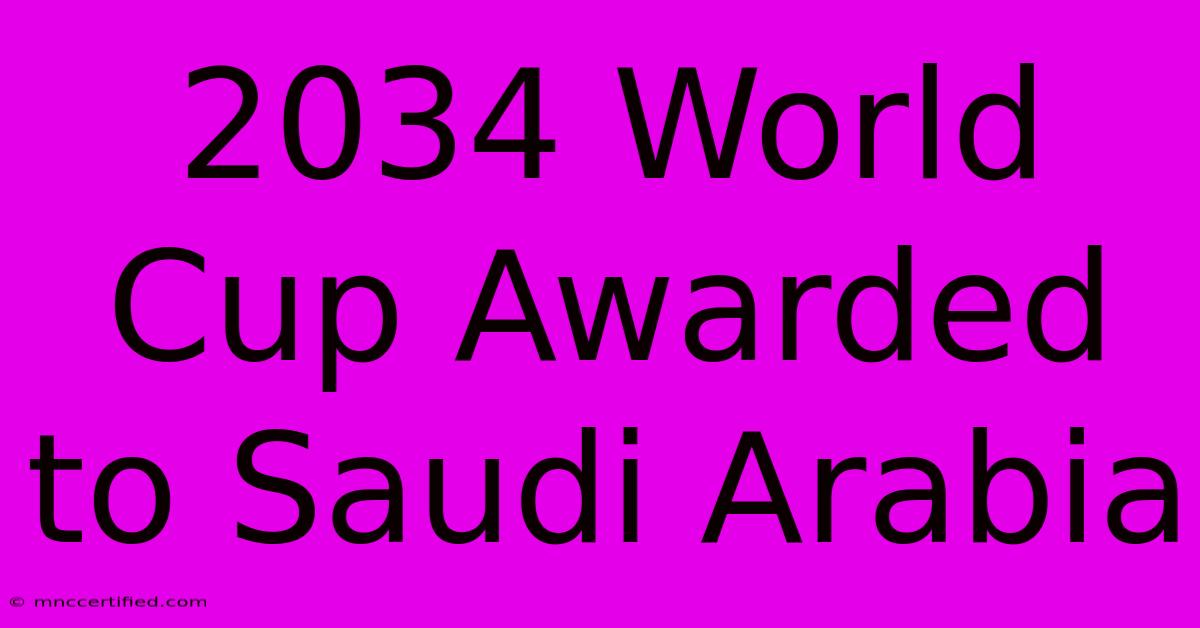2034 World Cup Awarded To Saudi Arabia

Table of Contents
2034 World Cup Awarded to Saudi Arabia: A Controversial Choice?
The decision to award the 2034 FIFA World Cup to Saudi Arabia has sparked intense debate worldwide. While the bid promised a modern, technologically advanced tournament, concerns regarding human rights, environmental impact, and the country's overall suitability to host such a prestigious event remain prominent. This article delves into the key aspects of this controversial choice, examining both the arguments for and against Saudi Arabia's hosting rights.
The Saudi Arabian Bid: Promises and Ambitions
Saudi Arabia's bid for the 2034 World Cup centered around ambitious plans for infrastructure development and technological innovation. Their proposal included the construction of state-of-the-art stadiums, utilizing sustainable practices where possible, and leveraging cutting-edge technology to enhance the fan experience. The promise of a digitally advanced tournament, complete with innovative fan engagement platforms, appealed to FIFA's desire to modernize the World Cup. Furthermore, the bid highlighted plans for significant investment in youth football development within the Kingdom.
Key Promises Highlighted in the Bid:
- State-of-the-art stadiums: The bid detailed plans for constructing new stadiums, many of which would incorporate sustainable design elements.
- Technological advancements: Innovative fan engagement tools and technologies were central to the proposal. This included potential use of VR/AR and enhanced digital accessibility.
- Investment in youth football: Significant resources were pledged to develop youth football infrastructure and programs across the country.
- Improved infrastructure: The bid detailed plans for upgrades to transportation and other essential infrastructure to support the tournament.
Controversies and Criticisms: Human Rights and Beyond
Despite the ambitious promises, the awarding of the 2034 World Cup to Saudi Arabia has faced substantial backlash. Human rights concerns are at the forefront of the criticism, with many pointing to the country's record on freedom of speech, women's rights, and the treatment of migrant workers. The environmental impact of constructing numerous new stadiums and accommodating a large influx of visitors is another significant concern. Critics argue that the environmental cost outweighs the benefits of hosting the event.
Major Concerns Raised by Critics:
- Human rights record: Concerns regarding freedom of speech, women's rights, LGBTQ+ rights, and the treatment of migrant workers are central to the criticism.
- Environmental impact: The large-scale construction projects and increased carbon footprint associated with the tournament raise serious environmental concerns.
- Lack of transparency: The bidding process itself has been criticized for a perceived lack of transparency and accountability.
- Sportswashing allegations: Critics allege that the awarding of the World Cup is an attempt by Saudi Arabia to improve its international image ("sportswashing").
Analyzing FIFA's Decision: Weighing the Factors
FIFA's decision to award the 2034 World Cup to Saudi Arabia involved a complex evaluation process, weighing the promises of the bid against potential concerns. While the technological advancements and infrastructure plans were undoubtedly attractive, the weight given to human rights and environmental considerations remains a point of contention. The decision highlights the ongoing tension between the pursuit of sporting spectacle and the responsibility of international organizations to address ethical and social issues.
The Future of the 2034 World Cup: Challenges and Opportunities
The 2034 World Cup in Saudi Arabia presents both significant challenges and opportunities. The success of the tournament will depend on the Kingdom's ability to address the ethical concerns raised while delivering on its ambitious promises. Increased scrutiny from international organizations, human rights groups, and the global media will likely continue to shape the event's development. The tournament could serve as a platform for positive change or reinforce existing criticisms. Only time will tell which path the 2034 World Cup ultimately takes.
Keywords: 2034 World Cup, Saudi Arabia, FIFA, human rights, sportswashing, environmental impact, stadiums, technology, controversy, bidding process, football, soccer, World Cup 2034, ethical concerns, sustainable development, infrastructure development.
Note: This article aims to provide a balanced perspective on a complex issue. The views expressed are not necessarily endorsed by the author. Further research is encouraged to form your own informed opinion.

Thank you for visiting our website wich cover about 2034 World Cup Awarded To Saudi Arabia. We hope the information provided has been useful to you. Feel free to contact us if you have any questions or need further assistance. See you next time and dont miss to bookmark.
Featured Posts
-
Uk Home Prices Affordability Crisis Says Ons
Dec 12, 2024
-
Monaco Eyes Arsenals Key Player
Dec 12, 2024
-
Gchq Christmas Puzzle Contains Clues
Dec 12, 2024
-
Bidwell Mansion Fire In Northern California
Dec 12, 2024
-
Lottery Musicals Free Tickets Available
Dec 12, 2024